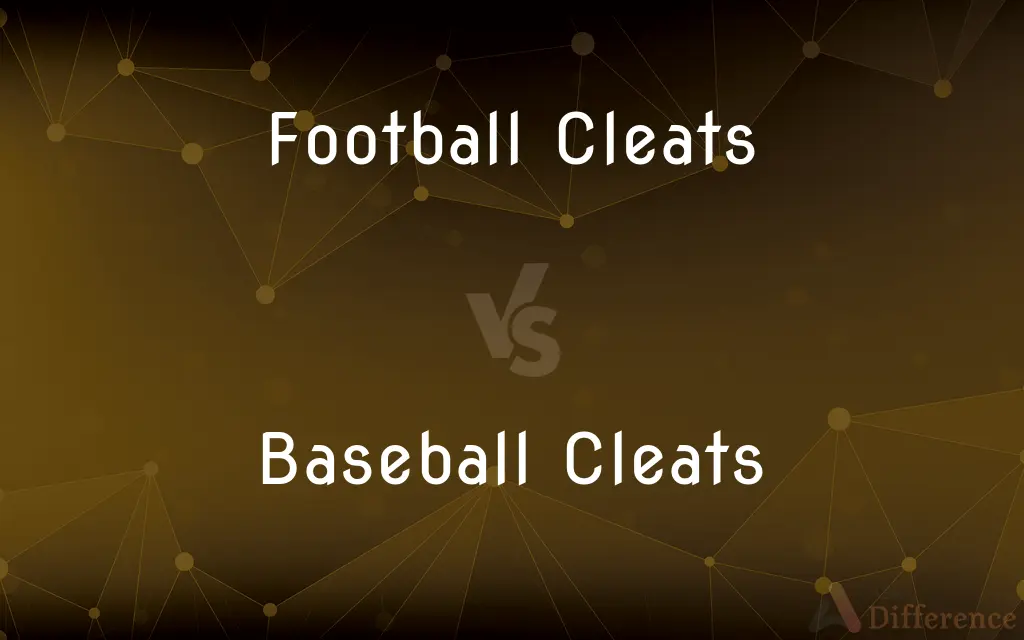Football Cleats vs. Baseball Cleats — What's the Difference?
By Tayyaba Rehman — Published on November 20, 2023
Football cleats have studs on the bottom for traction and are designed for grassy, muddy conditions. Baseball cleats feature a toe cleat for digging into the dirt when running bases and are tailored for diamond terrains.

Difference Between Football Cleats and Baseball Cleats
Table of Contents
ADVERTISEMENT
Key Differences
Football cleats and baseball cleats, while both designed to provide athletes with traction, serve different sports and hence have distinct features. Football cleats are developed for the dynamic needs of football players. Their studs are spread out on the shoe's bottom, providing stability, especially on grassy or muddy terrains where football is commonly played. On the other hand, baseball cleats have a unique design point - the toe cleat, which helps players dig into the dirt, especially when running bases.
Football cleats tend to be higher-ankled to offer players added support. This design choice assists in preventing ankle rolls, especially during rapid directional changes and tackles. Baseball cleats, however, lean towards a lower cut, facilitating quicker movements, especially crucial when fielding or running between bases.
It's essential to understand that using football cleats in a baseball game or vice versa can be detrimental. The toe cleat on baseball shoes can be hazardous in football, as it might cause tripping during tackles. Conversely, the stud distribution on football cleats might not offer the best traction on a baseball diamond, potentially compromising performance.
A key consideration when purchasing either football cleats or baseball cleats is the type of surface you'll be playing on. Football cleats are more versatile, with versions for turf and grass. Baseball cleats, while predominantly designed for diamond terrains, also come in turf versions, suitable for practice sessions or specific turf-based fields.
Comparison Chart
Primary Purpose
Designed for grassy/muddy terrains
Tailored for diamond terrains
ADVERTISEMENT
Stud/Cleat Placement
Spread out for stability
Feature a toe cleat for dirt
Ankle Cut
Higher for ankle support
Lower for quick movements
Surface Variations
Available for both turf and grass
Predominantly for diamond, but some for turf too
Risk in Other Sports
Might not offer traction in baseball
Toe cleat can trip in football
Compare with Definitions
Football Cleats
Feature studs on the bottom for traction.
The studs on the football cleats provide stability on muddy grounds.
Baseball Cleats
Shoes tailored for baseball players, ensuring grip on diamond terrains.
He got the latest baseball cleats for his tournament.
Football Cleats
Shoes designed for football players to ensure grip on the field.
He bought new football cleats for the upcoming season.
Baseball Cleats
Typically low-cut facilitating swift movements.
His low-cut baseball cleats make fielding more efficient.
Football Cleats
Suitable for diverse playing conditions, including turf and grass.
These football cleats are designed specifically for turf fields.
Baseball Cleats
Distinctive due to the toe cleat aiding in running bases.
The toe cleat on his baseball cleats helps him sprint faster.
Football Cleats
Essential equipment for football to enhance performance.
With the right football cleats, he improved his on-field agility.
Baseball Cleats
Designed primarily for diamond terrains but available for turf.
These baseball cleats are perfect for practice on the turf.
Football Cleats
Often high-ankled to prevent injuries.
His football cleats give him the ankle support he needs during games.
Baseball Cleats
Crucial for optimum performance in baseball games.
With his new baseball cleats, he felt more confident on the field.
Common Curiosities
Which cleats offer more ankle support?
Football cleats, being higher-ankled, offer more ankle support.
Are there baseball cleats designed for turf?
Yes, some baseball cleats are designed specifically for turf fields.
Can I use football cleats for a baseball game?
It's not recommended due to design differences and potential safety risks.
Which cleats are more versatile for different terrains?
Football cleats come in variations for both grass and turf.
Why do baseball cleats have a toe cleat?
The toe cleat helps baseball players dig into the dirt, especially when running bases.
Why are football cleats designed with spread-out studs?
To offer stability on the field, especially during rapid movements.
What's the primary function of football cleats?
Football cleats provide traction on grassy and muddy football fields.
How do the studs differ between football cleats and baseball cleats?
Football cleats have spread-out studs, while baseball cleats feature a toe cleat.
Do all baseball cleats come with a toe cleat?
Most do, but turf-specific versions might not have them.
Is it safe to use baseball cleats in football?
No, the toe cleat can pose a tripping hazard during tackles.
Can football cleats be used on turf fields?
Yes, but it's essential to get football cleats designed for turf.
How do baseball cleats enhance a player's performance?
They offer grip on diamond terrains, aiding in running, fielding, and batting.
Which cleats are better for quick side-to-side movements?
Baseball cleats, being lower-cut, facilitate quicker lateral movements.
What material are the cleats or studs usually made of?
They can be made of rubber, plastic, or metal, depending on the shoe and sport requirements.
Why do football players need high-ankled cleats?
To prevent ankle injuries during tackles and rapid changes in direction.
Share Your Discovery

Previous Comparison
Sphynx vs. Donskoy
Next Comparison
Volatile Oil vs. Fixed OilAuthor Spotlight
Written by
Tayyaba RehmanTayyaba Rehman is a distinguished writer, currently serving as a primary contributor to askdifference.com. As a researcher in semantics and etymology, Tayyaba's passion for the complexity of languages and their distinctions has found a perfect home on the platform. Tayyaba delves into the intricacies of language, distinguishing between commonly confused words and phrases, thereby providing clarity for readers worldwide.












































